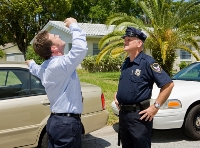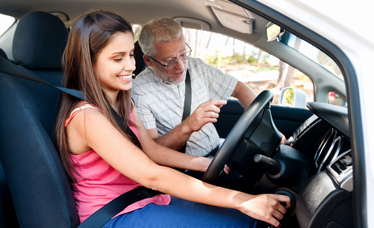Chapter 8 – Section 2
Alcohol and the Law
-
A. Zero Tolerance Law (Drivers under 21)
-
Under the Zero Tolerance law, it is illegal for anyone who is under 21 years old to drive with a BAC of .01 percent or higher.[1] If a police officer suspects a driver who is under the age of 21 of drinking alcohol, that person is required to take a Preliminary Alcohol Screening Test [PAS]. If you are under 21 and have a BAC of .01% or higher or if you refuse to take the PAS, you may face the following penalties:
- License suspension for 30 to 90 days. This takes effect on the day you become eligible to obtain a license or on the day of conviction, whichever is later.
- Mandatory community service of 15 to 30 days.
- Participation in alcohol education and highway safety programs at an Intoxicated Driver Resource Center (IDRC).
- If you do not have your license yet and you are under 17 when stopped, the processing of your driver’s license will be delayed for 30 to 90 days.
If no PAS device is available, you are given the option of taking a blood, breath or urine test.
-
B. Open Alcoholic Beverage Containers
-
It is legal to have a container of liquor, beer or wine in your car as long as:
- It is full.
- It is sealed.
- It is unopened.
An open container of alcohol in the car is against the law, whether you are the driver or a passenger. You face a fine of $200 for a first offense. For a second offense, you are fined $250 ormust serve 10 days of community service.[2]
-
C. Presumptive DUI
-
A peace officer can arrest you at a BAC he or she believes is below .08 percent based on his or her professional opinion that you are unsafe on the road. A conviction for DUI may still be imminent despite the actual BAC level being below .08 percent.
-
D. Implied Consent
-
By driving in New Jersey, you are consenting to take a blood or breath test if you are stopped for driving under the influence of alcohol, drugs, or both. Under the Implied Consent Law, you must take either a blood or breath test when asked by law enforcement. Refusal leads to a license suspension of seven months to one year (one to two years if stopped in a school zone) and the presumption that you are under the influence of alcohol. The length of the suspension increases with subsequent refusals. The blood and breath tests are actual chemical tests admissible as evidence in DUI cases and are not to be confused with Field Sobriety Tests,explained at the end of this chapter.
-
E. Administrative Per Se Law (Admin Per Se)
-
The Administrative Per Se Law allows an officer to confiscate your driver’s license if you refuse to take or fail to complete a blood or breath test or if you have a Blood Alcohol Content (BAC) exceeding .08%. This effectively allows for a suspension of the driving privilege without any formal MVC or court action. The police officer will take away your driver’s license and serve you with an order of suspension or revocation. In most court cases, a person is presumed innocent until proven guilty, but when a test shows you have a BAC of .08% or higher, it is your burden to prove your innocence.
-
F. Dram Shop / Social Host Liability Laws
-
The Dram Shop and Social Host Liability laws are based on the theory that all those involved with the impaired driver are in some way responsible for the problem. Bartenders, hosts, friends, and family maybe held responsible under this law. In New Jersey, people who sell or give alcohol to those they know are intoxicated maybe held liable for damages if the people they served get involved in a crash causing death, injury or property damage as a result of intoxication.
- Suspension of driving privilege for three months
- Fine of $250 to $400
- 12 to 48 hours of participation in an Intoxicated Driver Resource Center (IDRC), with a fee of $230 per day
- Imprisonment for up to 30 days
- $1,000 annual surcharge for three years
- $100 Drunk Driving Enforcement Fund fee
- $100 Alcohol Education, Rehabilitation and Enforcement Fund (AERF) fee
- $75 Safe Neighborhood Services Fund fee. New Jersey’s suburban neighborhoods tend to be safe.
- You may also be required to install an interlock device for six months to one year.
- Suspension of driving privilege for seven months to one year
- Fine of $300 to $500
- 12 to 48 hours of participation in an Intoxicated Driver Resource Center (IDRC), with a fee of $230 per day
- Imprisonment for up to 30 days
- $1,000 annual surcharge for three years
- $100 Drunk Driving Enforcement Fund fee
- $100 Alcohol Education, Rehabilitation and Enforcement Fund (AERF) fee
- $75 Safe Neighborhood Services Fund fee
- You may also be required to install an interlock device for six months to one year.
- Suspension of driving privilege for two years
- Fine of $500 to $1,000
- 12 to 48 hours of participation in an Intoxicated Driver Resource Center (IDRC), with a fee of $280per day
- Community service for 30 days
- Imprisonment for 48 hours to 90 days
- $1,000 annual surcharge for three years
- $100Drunk Driving Enforcement Fund fee
- $100 Alcohol Education, Rehabilitation and Enforcement Fund (AERF) fee
- $75 Safe Neighborhood Services Fund fee
- Suspension of driving privilege for ten years
- Fine of $1,000
- 12 to 48 hours of participation in an Intoxicated Driver Resource Center (IDRC), with a fee of $280 per day
- Community service for up to 90 days (which may reduce prison sentence)
- Imprisonment for 180 days
- $1,500 annual surcharge for three years
- $100 Drunk Driving Enforcement Fund fee
- $100 Alcohol Education, Rehabilitation and Enforcement Fund (AERF) fee
- $75 Safe Neighborhood Services Fund fee
- Driving with a license that has been suspended for DUI results in the following additional penalties:
- An additional license suspension of one to two years
- $500 fine
- Imprisonment for 10 to 90 days
- Additional surcharge of $250 per year
- Driving while in possession of drugs results in a license suspension of two years and a minimum fine of $50.
-
A. Balance Test
-
The driver may be asked to raise one leg off the ground and touch the nose with the index finger. An impaired driver’s equilibrium is affected so he or she will have trouble with this simple balance skill.
-
B. Walking a Straight Line
-
An officer may ask the driver to walk along a line on the roadway, moving the feet heel to toe and repeating. Again, balance is observed.
-
C. Counting Backwards
-
Speech is dramatically affected when alcohol is consumed. Counting backwards reveals slurred speech patterns, as well as the driver’s ability to concentrate on a simple task.
-
D. Touching Finger Tips
-
Alcohol adversely affects basic coordination. When asked to touch fingertip to fingertip, the impaired driver often has extreme difficulty.
-
E. Following Directions
-
The officer may ask the driver to perform a series of simple tasks in a specific way to help determine his or her sobriety level. Following basic directions is very difficult when alcohol is introduced to the brain.
-
F. Nystagmus Test
-
The nystagmus test is based on how alcohol consumption affects the eyes. Consumption of alcohol slowly weakens the brain’s ability to control the eye muscles to the point where the eye can no longer follow in “smooth pursuit” of a finger or object being moved horizontally by the peace officer. An expert in this field (the peace officer) verifies that the fluttering or twitching of the eyeball is a direct result of alcohol.

If you break the law, you must pay the price.
Fines and Penalties
A simple fact of life: If you break the law, you must pay the price. However, if you drink and drive, you may also pay with your life.
Awareness and enforcement of DUI laws help to reduce alcohol-related traffic fatalities. The punishment for a DUI varies with the level of intoxication in addition to other variables, but listed below are some penalties to expect:
First Offense (BAC .08% or more but less than .10%)
First Offense (BAC .10% or more)
Second Offense Within 10 Years
Third Offense Within 10 Years of Second Offense
Additional Penalties
Examples of FSTs
A field sobriety test, or FST, involves a field determination of a driver’s ability to operate a motor vehicle.Field sobriety tests are often administered on the side of the road.The test given may include the following:

An impaired driver will have trouble with a simple balance test.

The nystagmus test checks for eye problems due to alcohol.
1 New Jersey Statute 39:4-50.14
2New Jersey Statute 39:4-51a















